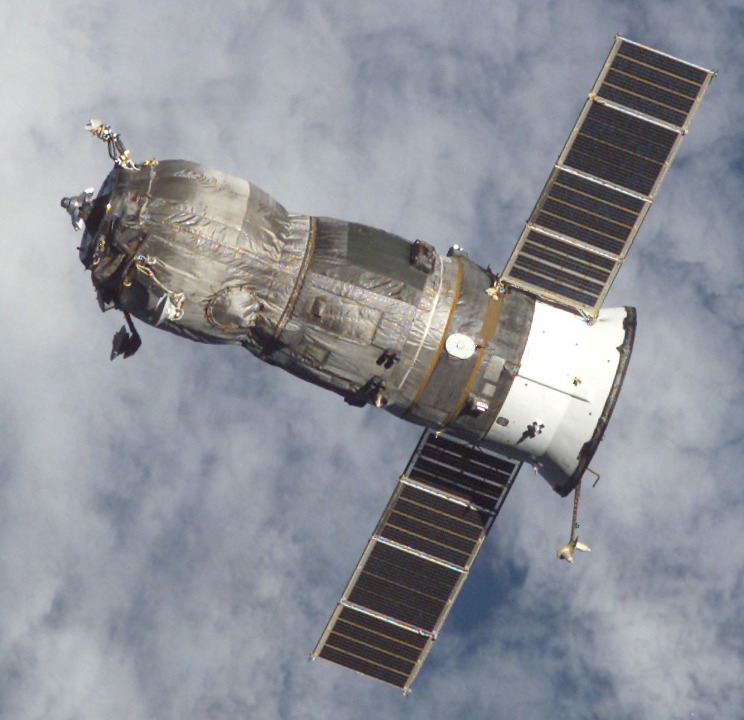Progress M on:
[Wikipedia]
[Google]
[Amazon]
Progress-M (russian: Прогресс-М, GRAU indices 11F615A55 and 11F615A60), also known as Progress 7K-TGM, is a  The first forty three Progress-M spacecraft were used to resupply
The first forty three Progress-M spacecraft were used to resupply
Russia
Russia (, , ), or the Russian Federation, is a transcontinental country spanning Eastern Europe and Northern Asia. It is the largest country in the world, with its internationally recognised territory covering , and encompassing one-eig ...
n, previously Soviet
The Soviet Union,. officially the Union of Soviet Socialist Republics. (USSR),. was a transcontinental country that spanned much of Eurasia from 1922 to 1991. A flagship communist state, it was nominally a federal union of fifteen nation ...
spacecraft which is used to resupply space stations. It is a variant of the Progress
Progress is the movement towards a refined, improved, or otherwise desired state. In the context of progressivism, it refers to the proposition that advancements in technology, science, and social organization have resulted, and by extension w ...
spacecraft, originally built in the late 1980s as a modernised version of the Progress 7K-TG
Progress 7K-TG (russian: Прогресс 7К-ТГ, italic=yes, GRAU index 11F615A15), was a Soviet uncrewed spacecraft used to resupply space stations in low Earth orbit. Forty three flew, delivering cargo to Salyut 6, Salyut 7, and Mir. It w ...
spacecraft, using new systems developed for the Soyuz-T and Soyuz-TM spacecraft. The 11F61560 variant incorporated further modernisation, with digital flight control systems replacing the earlier analogue ones. The older 11F615A55 spacecraft outlived the newer 11F615A60. The final Progress-M, Progress-M-UM, was launched on 24 November 2021.
 The first forty three Progress-M spacecraft were used to resupply
The first forty three Progress-M spacecraft were used to resupply Mir
''Mir'' (russian: Мир, ; ) was a space station that operated in low Earth orbit from 1986 to 2001, operated by the Soviet Union and later by Russia. ''Mir'' was the first modular space station and was assembled in orbit from 1986 to&n ...
, with subsequent spacecraft flying to the International Space Station
The International Space Station (ISS) is the largest modular space station currently in low Earth orbit. It is a multinational collaborative project involving five participating space agencies: NASA (United States), Roscosmos (Russia), JAXA ( ...
. , eighty seven spacecraft have been launched, with sixty seven using the older model, and twenty using the newer version. Launches of the 11F615A60 are continuing. One 11F615A60, Progress M-12M
Progress M-12M (russian: Прогресс М-12М, italic=yes), identified by NASA as Progress 44P, was an uncrewed Progress spacecraft that was lost in a launch failure on 24 August 2011, at the start of a mission to resupply the International ...
, was lost in a launch failure in August 2011. Progress M-27M
Progress M-27M (russian: Прогресс М-27М, italic=yes), identified by NASA as Progress 59P, was a Progress spacecraft used by Roscosmos in an unsuccessful attempt to resupply the International Space Station (ISS) in 2015.
Launch
Progre ...
was launched on 28 April 2015 but communication with the vessel was lost soon after. With vehicle control lost, it is expected to destructively re-enter due to orbital decay.
Two Progress M spacecraft, M-14 M14, M-14, or M.14 most often refers to:
* M14 rifle, an American military rifle
** Mk 14 Enhanced Battle Rifle, an American designated marksman rifle based on the M14
M14, M-14, or M.14 may also refer to:
Roads
* Highway M14 (Ukraine)
* M-14 (Mic ...
and M-38, were modified to carry VDU attitude control systems to the Mir
''Mir'' (russian: Мир, ; ) was a space station that operated in low Earth orbit from 1986 to 2001, operated by the Soviet Union and later by Russia. ''Mir'' was the first modular space station and was assembled in orbit from 1986 to&n ...
space station.
The Progress M1 is a derivative of the Progress M, optimized to carry more fuel, at the expense of dry cargo and water. It entered service in 2000, and was retired in 2004. A modernised version, incorporating the upgrades made to the Progress M 11F615A60 was scheduled to enter service in 2011, however this was cancelled before it made its first flight.
The upgraded Progress MS
The Progress (russian: Прогресс) is a Russian expendable cargo spacecraft. Its purpose is to deliver the supplies needed to sustain a human presence in orbit. While it does not carry a crew, it can be boarded by astronauts when docked t ...
spacecraft flew for the first time in December 2015.
See also
*Comparison of orbital spacecraft
Comparison or comparing is the act of evaluating two or more things by determining the relevant, comparable characteristics of each thing, and then determining which characteristics of each are similar to the other, which are different, and t ...
* Automated Transfer Vehicle
The Automated Transfer Vehicle, originally Ariane Transfer Vehicle or ATV, was an expendable cargo spacecraft developed by the European Space Agency (ESA), used for space cargo transport in 2008–2015. The ATV design was launched to orbit fiv ...
* Cygnus spacecraft
Cygnus is an expendable American cargo spacecraft developed by Orbital Sciences Corporation and now manufactured and launched by Northrop Grumman Space Systems as part of NASA's Commercial Resupply Services (CRS) program. It is launched by Nor ...
* SpaceX Dragon
American private space transportation company SpaceX has developed and produced several spacecraft named Dragon. The first family member, now referred to as Dragon 1, flew 23 cargo missions to the ISS between 2010 and 2020 before being retired. ...
* H-II Transfer Vehicle
References
External links
* * * {{Soyuz variants Progress (spacecraft)